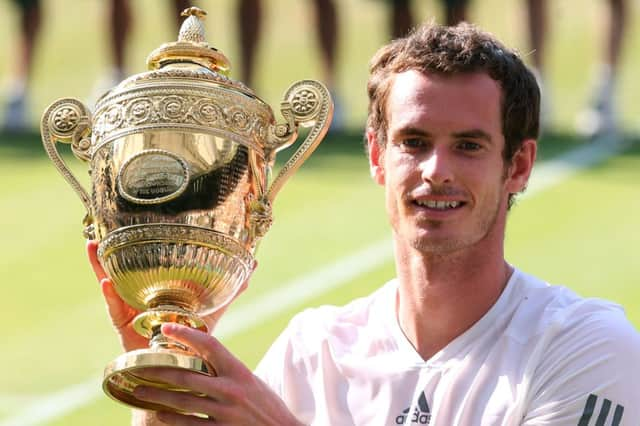Andy Murray: Dedication and talent led to triumph


It is a temptation we should resist.
Remember 18 months ago when many people decided Murray was doomed never to win any grand slam title at all, never mind Wimbledon? When they thought his 2012 final defeat by Roger Federer was confirmation that, in an era of unparalleled excellence, the Scot was always going to fall just short of what it took to win oneof the sport’s major honours?
They were soon proved wrong, as Murray used his Olympic Games triumph as a launchpad from which to win the US Open. But it would be just as wrong – just as lazy and presumptuous – to infer from that victory at Flushing Meadows that, as long as he still had two legs to stand on, Murray was sure to end that 77-year wait for a British man to win Wimbledon.
Advertisement
Hide AdAdvertisement
Hide AdIt wasn’t destiny or fate. It was hard work and utter, unswerving determination – as well, of course, as a whole lot of talent.
There is no non-stop flight to glory. There is only a pedestrian route that you need to take step by step.
The specific journey followed by Murray was reminiscent of the one taken by his compatriot Chris Hoy. Even as a young BMX competitor, Hoy would finish third in a race and ask what he could change to come second next time. He knew that the ultimate goal was to win, but he was aware that gradual progress was the way to get there.
So with Murray, who went from the third round at Wimbledon in 2005, the first time he competed there, to the fourth the following year. He was absent in 2007 because of injury, but came back in 2008 and made it to the quarter-finals. And so it continued…
In his debut campaign, he had led by two sets to love against former finalist David Nalbandian, before the superior stamina and experience of the Argentine player took him through in five. It was plain even then that Murray had the skill and the game awareness to go far, but he needed to become stronger, and that took time.
In 2009 he reached the first of three consecutive semi-finals. By then he had reached his first grand slam final – the US Open, in which he lost to Federer in straight sets – and the sceptics had begun to question if he had what it took to go that extra step and actually win one of the four big tournaments.
They were still asking it in 2012, when he reached the final for the first time. But although on the day the loss of that final to his Swiss adversary seemed devastating, the last steps towards the ultimate triumph in 2013 had already been taken.
In Ivan Lendl, Murray at last had a coach who shared his experience of losing several slam finals, and who had recovered from those setbacks. His previous coaches had all added something to his game, but here at last was a man who commanded his total respect.
Advertisement
Hide AdAdvertisement
Hide AdThe sheer neurosis of the Wimbledon crowd, the desperation to see a British man win the title, can be a debilitating factor for any home hopeful. There was more pressure than ever from that quarter on Murray this summer – but crucially, not as much as he has ever put on himself.
He sailed through the first three rounds, beating Benjamin Becker, Yen-hsun Lu and Tommy Robredo in regulation sets. In the fourth round Mikhail Youzhny took him as far as a tiebreak in the second set, but once that was out of the way he rattled the third off 6-1.
Fernando Verdasco was an altogether tougher opponent in the quarter-final, and perhaps a couple of years earlier Murray would not have recovered from going two sets to love down against the Spaniard. But he did, and in the semi-final fought back more quickly after losing the first set to Jerzy Janowicz in a bruising battle that will be remembered for the Scot’s fury after officials decided to close the Centre Court roof.
The four-set win took him through to a final against Novak Djokovic, the No 1 seed. The Serb was favourite not only because he had won before, but also because he had played better tennis over the course of the fortnight. The perceived wisdom on that Sunday afternoon was that Djokovic would prevail in a tight contest – perhaps in four sets, perhaps in five. But Murray’s hunger for the title was insatiable, and the power of his tennis was unstoppable as he edged the first two sets, 6-4 and 7-5.
When Murray took a 2-0 lead in the third, victory was in sight, but Djokovic then won four straight games. The challenger’s self-belief was put under severe scrutiny both then, and again after he had recovered to take a 5-4 lead. Serving for the championship, he had three match points but lost them all.
If ever there was a moment to sap the will of even the most determined of men, this was surely it. Djokovic then had three break points – but Murray saved them all, and moments later he was the champion at last.
It was the happiest of endings to an inspiring story, but it took every ounce of energy in Murray’s body to bring it about. Even when he was just a few points away from victory, the match could have begun to slip out of sight if he had wavered for a minute.
To call his victory destiny would be to belittle his achievement. It was his fearsome competitiveness that did it – that, and his meticulous attention to detail that made him focus on, and improve, every single aspect of his game.